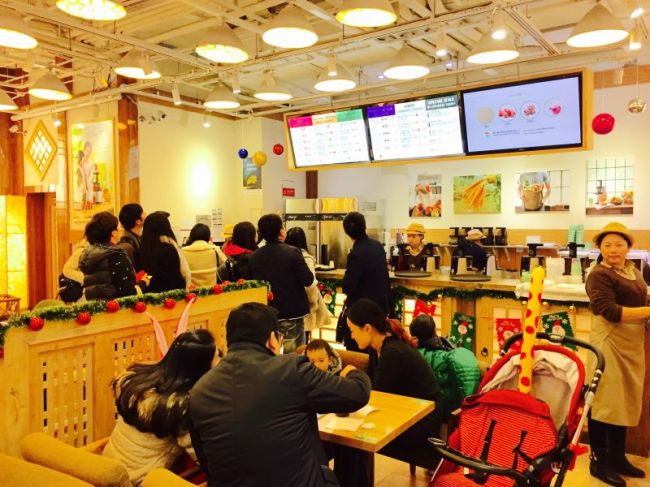CHENGDU, China -- On Chunxi Road, the largest shoppers’ street in downtown Chengdu, the capital city of China’s Sichuan province, large signboards and images of Korean entertainers promote fashion, cosmetics and other consumer goods.
From “Running Man” star Lee Kwang-soo to actress Jun Ji-hyun and K-pop group Big Bang, Korean pop culture icons attract people seeking things they have seen on TV.
Twenty-two-year-old college student Fei Lui went shopping Saturday morning at the Innisfree store, a cosmetics brand under Korea’s AmorePacific, across the street. A signboard of hunky actor Lee Min-ho greeted the shoppers at the doorstep.
 |
A Hurom cafe in the International Finance Square of Chengdu, Sichuan province. (Courtesy of Jung Chan-mi) |
“I first became aware of the brand through Korean film stars but now I am a fan of the products themselves,” she said, asking whether her choice of cream is equally popular in Korea.
Fei Lui is among the growing number of western Chinese consumers who are embracing and purchasing Korean products, thanks to the ever-growing popularity of Korean pop culture.
According to the Korea Trade-Investment Promotion Agency, the province with more than 100 million residents is one of the most promising markets for Korean businessmen.
Its consumer market is sized at around $212.6 billion as of 2013, and keeps growing. The plummeting stock market that has hit Beijing and Shanghai has left Western China relatively immune, which boosts attraction, observers say.
The exact data of Korean consumer goods exported to Sichuan in particular is unavailable but many people note that hallyu, or the Korean wave, has become a fixture there.
“We strategically place Korean staff or Korean-speaking staff to take orders so that people could instantly notice that the store sells Korean products,” said Jung Tae-hwa, who is the official importer of Korean juice maker Hurom in Sichuan province.
Jung currently has 15 sales outlets, and two Hurom cafes -- selling juices squeezed from the juicers -- in the region, selling as many as 10 $665 juicers a day in retail, and hundreds more in wholesale.
His daughter, Jung Chan-mi, who takes charges of the cafe business, said that it was the power of hallyu that made Chinese, who generally avoid cold drinks, try the freshly squeezed juices and become fans of it.
Delia Du, who works for the official Chinese importer of Korean mid-weight cafe franchise De Chocolate Coffee, said that Korean consumer goods sales were more promising in western China because it was still in a boom stage compared to the more mature Beijing and Shanghai markets.
“People are ready to spend money, and they are hugely influenced by Korean TV shows. They want to communicate with Koreans, and even speak in Korean language with them. Being Korean is still that rare,” she said.
But things aren’t always rosy. Like many businesses, a thorough understanding of the Chinese consumers is still needed. De Chocolate Coffee had to adjust the sweetness of its chocolate drinks -- Sichuan residents enjoy savory and spicy flavors but not sugariness, after seeing sales struggle.
“People don’t just prefer things because they are from China. If they don’t know it, they wouldn’t buy it. Thorough market research is a must, and please keep an eye on the Chinese pop culture to see what is happening,” Jung said.
It is also imperative to meet the right local partners and have the right strategy in business, people say.
Caffe Bene, one of the largest Korean coffee shop franchises, once blossomed in China -- in Chengdu alone it had several outlets.
However, some of the stores are now closed while others aren’t as crowded as they used to be, amid rumors that the company has split with its Chinese investors following differences.
By Bae Ji-sook (
baejisook@heraldcorp.com)





![[Exclusive] Hyundai Mobis eyes closer ties with BYD](http://res.heraldm.com/phpwas/restmb_idxmake.php?idx=644&simg=/content/image/2024/11/25/20241125050044_0.jpg)
![[Herald Review] 'Gangnam B-Side' combines social realism with masterful suspense, performance](http://res.heraldm.com/phpwas/restmb_idxmake.php?idx=644&simg=/content/image/2024/11/25/20241125050072_0.jpg)

